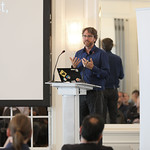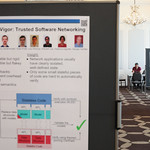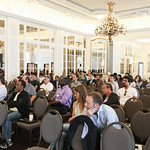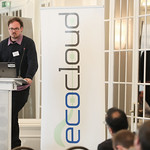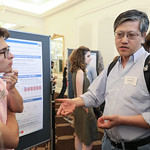
- This event has passed.
EcoCloud Annual Event – 2018

Welcome to the EcoCloud 2018 Annual Event. This year’s event will feature industrial speakers and EcoCloud researchers on June 18th and 19th.
 Keynote
Keynote
Catching and Preventing Privacy Problems in Systems and Deep Neural Networks
Úlfar Erlingsson, Google
For the last several years, Google has been leading the development and real-world deployment of state-of-the-art, practical techniques for learning statistics and ML models with strong privacy guarantees for the data involved. I’ll introduce this work, and the RAPPOR and Prochlo mechanisms for learning statistics in the Chromium and Fuschia open-source projects. Then I’ll present a new “exposure” metric to estimate the privacy problems due to unintended memorization in machine learning models—and how it can allow extracting individual secrets, such as social security numbers. Finally, I’ll give an overview of the practical techniques we’ve developed for training Deep Neural Networks with strong privacy guarantees, based on Differentially-Private Stochastic Gradient Descent and Private Aggregation of Teacher Ensembles.
Úlfar Erlingsson is a Senior Staff Research Scientist in the Google Brain team, currently working primarily on privacy and security of deep learning systems. Previously, Úlfar has led computer security research at Google, and been a researcher at Microsoft Research, Silicon Valley and Associate Professor at Reykjavik University. Úlfar was co-founder and CTO of the internet security startup Green Border Technologies and Director of Privacy Protection at deCODE Genetics. Úlfar holds a PhD in computer science from Cornell University.
Industrial Session
This year’s industrial session will feature prominent speakers from the IT industry including:
 Designing Processors for Intelligence
Designing Processors for Intelligence
Simon Knowles, Graphcore
Machine Intelligence (MI) is a new class of computing workload of sufficient importance to rethink computing from top to bottom. This is the beginning of the real age of massively parallel computing, combined with a new dominant data class — high-dimensional probability distributions. This talk will discuss how physics constrains silicon processor evolution, as performance demand is exploding, and what is needed in terms of abstraction to make programming tractable.
Simon is co-founder, CTO and EVP Engineering of Graphcore, a British start-up developing processors ground-up for machine intelligence. Graphcore is Simon’s third processor start-up, preceded by Element14 (acquired by Broadcom in 2000) and Icera (acquired by Nvidia in 2011). Before that Simon was responsible for processor design at STmicro, via the acquisition of Inmos. Many of Graphcore’s engineers share this heritage of developing new types of processor and software tools for newly emergent workloads.
 The Evolving Architecture of the Web and its Impact on Security, Privacy, and Latency
The Evolving Architecture of the Web and its Impact on Security, Privacy, and Latency
Nick Sullivan, Cloudflare
The web is built on top of a few fundamental protocols: HTTP, TLS, and DNS. The architecture of the web today is very different from what is taught in computer networking classes. We will examine some of the impacts of recent changes and how internet standards such as HTTP/2 and DNS over HTTPS are being developed to improve user privacy in the new architecture.
Nick Sullivan is a leading cryptography and security technologist. As Head of Cryptography at Cloudflare he is responsible for overseeing all cryptographic products and strategy. He was instrumental in building Cloudflare’s security engineering team and led major projects such as Keyless SSL and TLS 1.3.
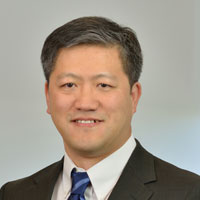 On Reinvigorating Foundational uArch Research to Boost IPC
On Reinvigorating Foundational uArch Research to Boost IPC
Hong Wang, Intel Labs
Hong is an Intel Fellow and has been with Intel for 22 years. He has managed the Microarchitecture Research Lab (MRL) in Intel Labs since 2006. Hong is a member of Intel’s Corporate Research Council (CRC) and responsible for guiding external research investments in two areas: computer architecture and emerging technologies. He is the managing sponsor who helped launch two recent Intel University Research programs (aka ISTC), one on Agile arch/design in 2017 and the other on Foundational uarch research (FoMR) jointly with NSF in 2018.






